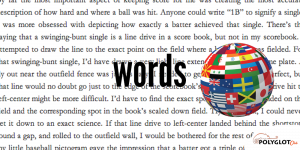Difference between revisions of "Language/Multiple-languages/Vocabulary/Must‐Know-Words-for-Polyglots"
< Language | Multiple-languages | Vocabulary
Jump to navigation
Jump to search
Luan arauj (talk | contribs) (The first phrases, there was an unnecessary final point.) |
|||
| Line 61: | Line 61: | ||
|[[wikipedia:Variety (linguistics)|variety]] | |[[wikipedia:Variety (linguistics)|variety]] | ||
|[[wikipedia:Dialect|dialect]] | |[[wikipedia:Dialect|dialect]] | ||
|[[wikipedia:Standard language|standard language]] | |[[wikipedia:Standard language|standard language]] | ||
|} | |} | ||
| Line 119: | Line 118: | ||
|[[wikipedia:Glottal consonant|glottal consonant]] | |[[wikipedia:Glottal consonant|glottal consonant]] | ||
|} | |} | ||
|} | |} | ||
|- | |- | ||
| Line 246: | Line 243: | ||
|[[wikipedia:Lemma_(morphology)|lemma]] | |[[wikipedia:Lemma_(morphology)|lemma]] | ||
|- | |- | ||
| | |[[wikipedia:Cognate|cognate]] | ||
|- | |||
|[[wikipedia:Word_formation|word formation]] | |||
{| class="wikitable" | |||
|[[wikipedia:Loanword|loanword]] | |||
{| class="wikitable" | {| class="wikitable" | ||
|[[wikipedia:Anglicism|anglicism]] | |[[wikipedia:Anglicism|anglicism]] | ||
|[[wikipedia: | |} | ||
|[[wikipedia:Morphological_derivation|derivation]] | |||
|[[wikipedia:Compound_(linguistics)|compound]] | |||
|[[wikipedia:Blend_word|blend word]] | |||
|[[wikipedia:Acronym|acronym]] | |||
|[[wikipedia:Calque|calque]] | |||
|[[wikipedia:Neologism|neologism]] | |||
|[[wikipedia:Back-formation|backward-formation]] | |||
|} | |} | ||
|- | |||
|[[wikipedia:Root (linguistics)|root]] | |||
|- | |- | ||
| | | | ||
| Line 697: | Line 704: | ||
|[[wikipedia:Holonymy|holonym]] | |[[wikipedia:Holonymy|holonym]] | ||
|} | |} | ||
|- | |||
|[[wikipedia:Register_(sociolinguistics)|register]] | |||
|- | |- | ||
|[[wikipedia:Linguistic relativity|linguistic relativity]] | |[[wikipedia:Linguistic relativity|linguistic relativity]] | ||
Revision as of 19:20, 8 September 2020
Must-know words for polyglots.
[Lesson in progress]
Polyglots are really passionate about language learning and linguistics, therefore it's important for them to learn all kinds of terms. On this page, you will find the most important ones.
If you need a full GLOSSARY OF LINGUISTIC TERMS, see:
If you need a clear categorization of linguistics, see:
-- AUTHOR --
